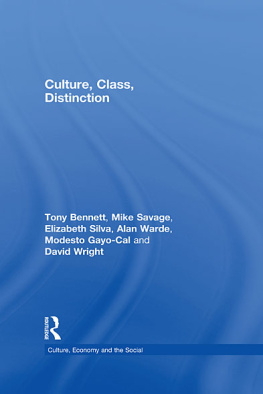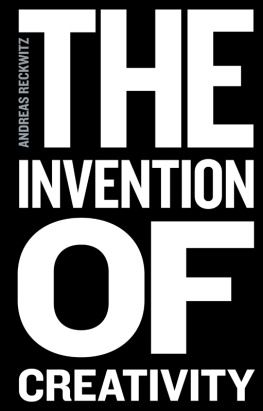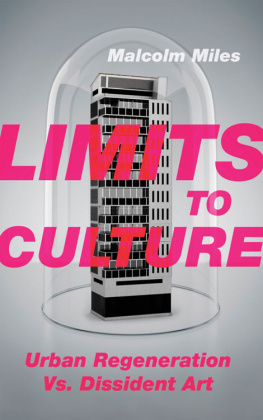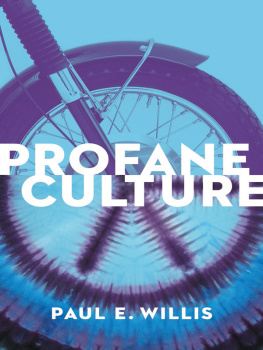
Culture is bad for you
Inequality in the cultural and creative industries
Orian Brook, Dave OBrien, and Mark Taylor
Manchester University Press
Copyright Orian Brook, Dave OBrien and Mark Taylor 2020
The right of Orian Brook, Dave OBrien and Mark Taylor to be identified as the authors of this work has been asserted by them in accordance with the Copyright, Designs and Patents Act 1988.
Published by Manchester University Press
Altrincham Street, Manchester M1 7JA
www.manchesteruniversitypress.co.uk
British Library Cataloguing-in-Publication Data
A catalogue record for this book is available from the British Library
ISBN 978 1 5261 4416 4 paperback
First published 2020
The publisher has no responsibility for the persistence or accuracy of URLs for any external or third-party internet websites referred to in this book, and does not guarantee that any content on such websites is, or will remain, accurate or appropriate.
COVER: Rob Pinney
Typeset by Newgen Publishing UK
Contents
Graphics by Nigel Hawtin, nigelhawtin.com
Culture is bad for you is published at an uncertain time for cultural and creative industries. At the time of writing this preface, the death toll from the virus, along with the virus impact on global society and economy, suggest a crisis of unique proportions.
The crisis looks to be especially grave for the cultural and creative industries. It is unclear how cultural activity taking place in venues and shared public spaces will reopen, if the pre-pandemic business models will be sustainable in the future, and how many individuals will lose their jobs. How long the recovery will take, and any possibility of returning to some form of business as usual for artistic and cultural life as seen before the crisis, is still impossible to determine.
The danger signs are ominous, irrespective of whichever cultural industry or cultural occupation we assess. The impact of streaming and the importance of live performances for the music industry mean many musicians face a collapse in their income. The uncertainty of reopening schedules, along with possible social distancing measures, means performance spaces, whether for theatre, dance, or music, may no longer be sustainable. The collapse of visitor numbers has already closed venues, with museums, galleries, and heritage sites especially vulnerable. Film and television production, with its dependence on studios or on-location work and large numbers of crew, and sometimes cast, faces difficulties. This is to say nothing about the changes in release schedules, the collapse in advertising revenue, and the continued existence of cinemas and even television channels.
Governments, faced with increased financial pressures as a result of the crisis and subsequent, predicted, economic depression, may struggle to offer continued direct funding and investment to the cultural sector. Decisions about welfare and support schemes for the economy and for society in general may focus on areas besides the cultural sector.
The industry-level impacts will be felt by workers most directly. Many of our cultural sectors are based on project work and staffed by a mixture of freelancers, self-employed, and part-time workers. Many of these workers will not qualify for furlough or other government support. As we discuss in of the book, precariousness is endemic to particular cultural occupations and at particular stages in cultural careers.
The uneven distribution of childcare responsibilities, an issue we discuss in , will impact womens creative careers more heavily than their male counterparts. This uneven distribution has become a narrative offered by decision-makers in specific sectors, such as film and television, to explain the lack of progress for womens careers. We are likely to see this narrative continue, masking existing sexist assumptions in hiring and commissioning practices.
The importance of networks to access work will mean greater difficulties for those without social, cultural, and economic resources, a theme we explore in to cultural careers; any contraction of cultural labour markets will mean fewer opportunities to get on for those already in cultural occupations.
As we show throughout the book, the impact of the basic issue of access to jobs will not hit the workforce evenly. For women, people of colour, and those from working-class origins, we will see earlier exits from cultural labour markets than might otherwise have happened. As competition for the smaller numbers of cultural and creative careers intensifies, we should expect our cultural occupations to become even more elite than they are now.
Were choosing to comment on these examples as they highlight how the impact of the pandemic is not a result of individual actions or choices. Rather, the impact of the pandemic is shaped by the structures of business models, labour markets, and funding settlements, alongside government policy and scientific advice. Our examples from film and television, music, theatres, and museums and galleries, reflect longstanding issues of inequalities. These are the issues our book analyses.
At the same time as we are fearful for the future of cultural workers, businesses, and organisations, culture has been crucial to sustaining individuals, communities, and nations during the pandemic. Culture has been a vital resource during periods of lockdown. We have seen renewed examples of, and a renewed faith in, the way culture is good for you.
Everyday cultural production, including painting, craft, writing, and making music seems to have been an important source of wellbeing for people during the crisis. Digital platforms and technologies have enabled new forms of cultural activity and accelerated sharing of artistic and cultural practices.
Cultural consumption, aided by an expansion in digital modes of delivery, has also been crucial. Books, with films, television, streaming of theatre and musicals, virtual visits to galleries and museums, and radio and podcasts, have all played a role in helping people through the crisis. Some parts of the cultural sector, for example digital content platforms seeing new subscribers and new audiences, may even be thriving.
There is a distinct irony in this uptake of cultural resources. It comes just as the sustainability of the cultural producers in the sector, and the ability of individual cultural workers to sustain themselves from their work, is most under threat. Even the stories of success, such as digital platforms, may hide new uneven power relationships and unequal divisions of revenue and profit.
In this context, with the fear for the future of culture and the hope of new forms of production and consumption, it may seem strange to suggest we foreground an analysis of inequality. Yet this is almost certainly the most important moment for that analysis.
Early signs are that our digital cultural life under lockdown, whether as consumers or producers, as watchers and readers or as makers, will follow many of the existing patterns of inequality we discuss in illustrates, culture can be powerfully good for you. Understanding inequality is a starting point for the task of rebuilding after COVID-19. It means the present moment gives us a chance to create a fairer and more just cultural sector.
This book is the result of a great collaboration. It has been a collaborative effort between the three authors, but it has also been a collaboration with others far beyond the writing team. We are deeply grateful for everyone who has worked directly on the research projects and published papers underpinning this book. They include Heather Carey, Rebecca Florisson, Sam Friedman, Laurie Hanquinet, Daniel Laurison, Neil Lee, Siobhan McAndrew, Andrew Miles, and Kate Oakley. In particular we are especially indebted to Jordan Tchilingirian and Sara De Benedictis, along with Nikki Kane and Bozena Wielgoszewska. It is also a collaboration that has been possible as a result of the support of the UKs Arts & Humanities Research Council, as well as support from the ESRCs Impact Accelerator Account at the University of Edinburgh, and the Edinburgh Futures Institutes research development funding. Orian was granted a postdoctoral fellowship from the Institute for the Advanced Studies of the Humanities at University of Edinburgh to support a period of the writing of this book.







